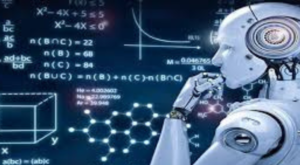 Introduction:
Introduction:- Key Features of AI Personal Assistants
- The Evolution of AI Assistants:
- Major Players in the Field :
- The Rise of AI-Powered Assistants:
- Enhancing Productivity with AI-Powered Personal Assistants:
- Enhancing Productivity:
- Future Trends in AI Assistants
- FAQ’S
- Q1: What is an AI-powered personal assistant?
- Q2: How do AI-powered personal assistants work?
- Q3: What are some popular AI-powered personal assistants?
- Q4: How can AI-powered personal assistants benefit users?
- Q6: Can integrate with other apps and platforms?
- Q7: How can AI-powered personal assistants benefit businesses?
- Q5: Are AI-powered personal assistants secure?
- Conclusion:
 Introduction:
Introduction:
Personal assistants are the largest and fastest growing field to make people’s daily lives easier. It is undeniable that setting notes, answering people’s questions and automating tasks through this technology is due to its growth and highlighting its ease of use.
Now, personal assistants would head on to the next stage to a more intelligent stage and be more thoughtful in turn, thus paving the way for what the makeover would be like in our tasks, schedules, and communications. This is set to redefine our lives for betterment.
Key Features of AI Personal Assistants
Degree Assistants are designed to make our daily life very simple and with many modern features. Some of the key features are explained below.
Voice Recognition:
The basic aspect of this is the ability to understand our voice and perform it at its best. Users can perform various tasks using their voices.
Task Automation:
It has an amazing ability to automate many tasks like setting appointments and sending emails.
Contextual Understanding:
AI assistants have the ability to better understand the situation by using the data they provide from trips when making recommendations to others.
Natural Language Processing (NLP)
It understands human language and helps provide correct answers to users’ queries. NLP technology makes AI assistants modern and user-friendly. It enables users to easily and clearly communicate with AI assistants through speech. Natural language processing is one of the most important features of AI personal assistants. It helps us to understand our human language and provide the correct answers to the various queries of the users. And this technology is very modern and user friendly. It is very helpful for users to communicate easily and clearly through speech
The Evolution of AI Assistants:
Major Players in the Field :
ChatGPT: Developed by OpenAI, ChatGPT excels in generating human-like text based on prompts, making it a versatile tool for drafting emails, writing content, and providing insightful responses.
Siri: Apple’s Siri continues to evolve with enhanced conversational abilities and deeper integration with Apple’s ecosystem, offering seamless control over smart home devices and personal scheduling.
Google Assistant: Known for its advanced search capabilities and integration with Google services, Google Assistant helps users manage tasks, get information, and control smart devices efficiently.
Amazon Alexa: Amazon’s Alexa has become a household name, with a range of skills and integrations that support everything from shopping to home automation.
The Rise of AI-Powered Assistants:
How is AI Transforming Personal Assistance?
Popular AI-Powered Personal Assistants in 2024
In 2024, several of these topics emerged as leaders in the market. Each offers unique features and capabilities. Some of the most popular of it include Amazon’s Alexa, Apple’s Siri, Google Assistant, and Microsoft’s Cortana.
Enhancing Productivity with AI-Powered Personal Assistants:
Streamlining Task Management
One of the key benefits of this ability to streamline task management. By automating routine tasks, such as setting reminders, creating to-do lists, and organizing schedules, these assistants free up valuable time for users to focus on more important and strategic activities. This increased efficiency leads to higher productivity and better work-life balance.
Improving Communication and Collaboration
It also excels in improving communication and collaboration among team members. By facilitating seamless interactions through voice commands, text messages, and emails, these assistants help teams stay connected and informed, regardless of their physical location. This enhanced communication fosters collaboration, boosts creativity, and accelerates project timelines.
Enhancing Productivity:
These are not just about convenience; they are powerful tools for boosting productivity.
Task Management and Scheduling
AI assistants help manage and prioritize tasks efficiently. They can schedule meetings, set reminders, and even suggest optimal times for activities based on your preferences and past behavior.
Streamlining Communication
By drafting emails, summarizing messages, and even suggesting responses, AI assistants save time and reduce the cognitive load associated with managing communications.
Data Analysis and Insights
Advanced AI assistants can analyze large sets of data, provide insights, and generate reports, helping users make informed decisions without diving deep into the data themselves.
Automation of Routine Tasks
From automating routine business processes to handling repetitive household chores, AI assistants can take over mundane tasks, freeing up time for more strategic activities.
Future Trends in AI Assistants
Increased Personalization
Future AI assistants will offer even greater levels of personalization, adapting their responses and actions based on individual user preferences and behaviors.
Enhanced Emotional Intelligence
Natural language processing and sentiment analysis improvements will enable AI assistants to better understand and respond to emotional cues, making interactions more intuitive and supportive.
Integration with Emerging Technologies
It will increasingly integrate with other emerging technologies such as augmented reality (AR) and virtual reality (VR), providing immersive and interactive experiences.
Greater Autonomy and Decision-Making
Future assistants will be able to make more complex decisions independently, offering proactive solutions and recommendations based on user goals and context.
FAQ’S

Q1: What is an AI-powered personal assistant?
These are virtual assistants that use artificial intelligence technology to understand and respond to user commands. These assistants can perform a wide range of tasks, such as setting reminders, sending messages, making phone calls, and even providing personalized recommendations based on user preferences.
Q2: How do AI-powered personal assistants work?
It is used in natural language processing and machine learning algorithms to understand user commands and provide relevant responses. These assistants continuously learn from user interactions to improve their performance and accuracy.
Q3: What are some popular AI-powered personal assistants?
Some popular AI-powered personal assistants include Amazon’s Alexa, Apple’s Siri, Google Assistant, and Microsoft’s Cortana. These assistants are integrated into various devices, such as smartphones, smart speakers, and smart home devices, allowing users to access their services easily.
Q4: How can AI-powered personal assistants benefit users?
- Increased productivity: It can help users stay organized, manage their tasks, and save time by automating repetitive tasks.
- Access to information: It can provide users with instant access to information, such as weather updates, news, and directions.
- Personalized recommendations: It can offer personalized recommendations based on user preferences, such as suggesting restaurants or movies to watch.
- Hands-free operation: It can be operated hands-free, allowing users to perform tasks while on the go or when their hands are occupied.
Q6: Can integrate with other apps and platforms?
Absolutely! Most AI-powered personal assistants offer seamless integration with popular apps and platforms, allowing users to access a wide range of services through a single interface.
Q7: How can AI-powered personal assistants benefit businesses?
It can help businesses streamline operations, improve customer service, and boost employee productivity.
Q5: Are AI-powered personal assistants secure?
These are designed with security and privacy in mind. These assistants use encryption and secure connections to protect user data and keep sensitive information confidential.
